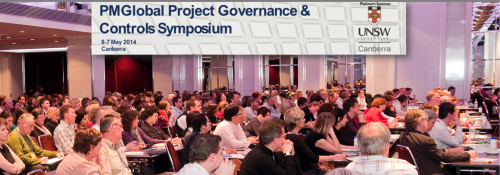 The Project Governance and Controls Symposium 2014, Canberra, is in full swing with wall-to-wall interesting presentations!
The Project Governance and Controls Symposium 2014, Canberra, is in full swing with wall-to-wall interesting presentations!
The focus of this post is the presentation by Stephan Vandevoorde on the work he is involved in at Ghent University, Belgium focused on developing processes for the validated testing of project control tools entitled ‘If Time is Money, then Accuracy is Important’.
The problems with studying the effect of project control processes in live projects are many, the most significant being:
- The control function generates information that influences management action causing different outcomes.
- The ‘Hawthorne Effect’ where people being ‘observed’ change behaviour because they are being observed.
- The uniqueness of each project, its team dynamics, luck, and the overall operating environment making replication of an ‘experiment’ difficult.
As part of their on-going work to validate Earned Schedule (ES) the Ghent team have developed a set of project networks using different topologies to emulate schedules ranging from those that are largely sequential, through to those that have a high level of parallel working. The models are updated with a range of 9 different progress options leading to a total of 2.8 million unique data sets. This resource provides a unique test bed for evaluating the effectiveness of various predictive and preventative tools and techniques. For more on this valuable resource, which is available for research, see http://www.or-as.be/research/database
One of the earlier studies (on a smaller simulation) focused on testing the effectiveness of various techniques in predicting the final schedule outcome of a project. And this research has proved me wrong! In a blog post following last year’s PGCS ‘Earned Schedule comes of Age’ I lamented the fact that a detailed study proving Earned Schedule (ES) was significantly better at predicting project completion than the traditional Earned Value SPI had not taken the extra step and also demonstrated its predictive effectiveness compared to traditional CPM. My paper Why Critical Path Scheduling (CPM) is Wildly Optimistic highlights the issues but lacks statistical validation. As it happens, the ‘missing’ studies had been done and the outcomes presented by Stephan showed the results of a 2008 study by Prof. M. Vanhoucke (also of Ghent University) that demonstrate the superiority of Earned Schedule as a predictive tool designed to complement the true focus of CPM which should be the optimisation of resources and workflow (rather than the projection of the overall project completion – for more on this read my paper).

So the basic research has been done, the results are conclusive and based on the research the effective controlling of projects needs a combination of CPM, EV and ES for optimum results! The research frontier is moving towards effective early indicators such as the ‘P factor’ and intervention and with the data tools now available, statistically significant analysis becomes feasible.
With the steady stream of papers validating Earned Schedule, I hope the flow of misleading information from a few die-hard traditionalists in the USA is finally extinguished and comments from leading authors such as Quentin Fleming and Joel Koppelman in the 4th Edition of ‘Earned Value Project Management’ (2010), that ‘The authors do not endorse [earned schedule]. Nor have they ever read any scientific studies that support [it]’ disappear. It really does not matter what Fleming and/or Koppelman have bothered to read, making misleading statement like this helps no one.
The challenge is developing tools and techniques that help manage projects in an environment of increasing complexity – and as one of the other presenters, Stephen Hayes from the International Centre for Complex Project Management (ICCPM), traditional tools such as CPM and EV are important, but simply not sufficient in the emerging domain of complex project management, or as my paper to the PGCS suggests, Agile projects.









